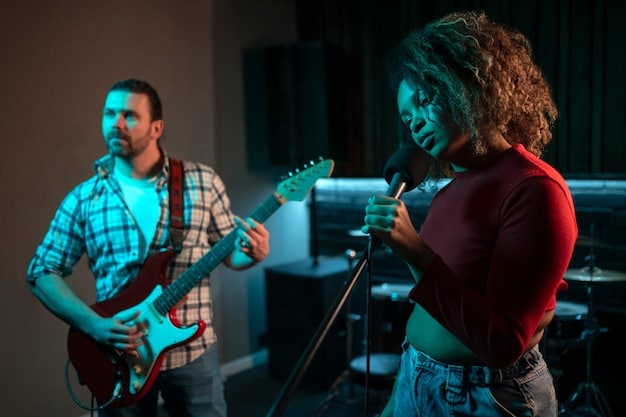Emerging Artists: Website SEO to Get More Fans

Emerging Artists: Optimize Your Website for Search Engines is your essential guide to boosting online visibility, connecting with more fans, and growing your music career through strategic SEO practices.
Are you an emerging artist looking to expand your reach and connect with more fans? In today’s digital landscape, having a strong online presence is crucial. One of the most effective ways to achieve this is by optimizing your website for search engines. This guide will provide you with actionable **emerging artists: optimize your website for search engines** strategies to help you get found by more fans, build your brand, and grow your music career.
Why SEO Matters for Emerging Artists
In the music industry, breaking through the noise and reaching potential fans can be challenging. Search engine optimization (SEO) can be their secret weapon to succeed. Here’s why SEO is a game-changer for emerging artists:
Increased Visibility
SEO helps your website rank higher in search engine results. When fans search for music related to your genre, style, or influences, a well-optimized website ensures you appear prominently, making it easier for new fans to discover you.
Targeted Traffic
SEO isn’t just about attracting any traffic; it’s about attracting the right traffic. By targeting specific keywords and phrases related to your music, you can attract visitors who are genuinely interested in your work. Quality over quantity is the key here.
Cost-Effective Marketing
Compared to traditional marketing methods like radio ads or print campaigns, SEO is a cost-effective way to promote your music. While it requires time and effort, the long-term benefits of organic search traffic far outweigh the costs.
- Enhanced Credibility: Ranking high on search engine results lends credibility to your brand, as potential fans and industry professionals see you as a relevant and authoritative figure in your genre.
- Long-Term Growth: Unlike paid advertising, which stops delivering results as soon as you stop paying, SEO provides sustainable, long-term growth as your website continues to rank and attract organic traffic.
- Data-Driven Insights: SEO provides valuable data and insights into your audience’s behavior, preferences, and the keywords they use to find music like yours, allowing you to refine your marketing strategies.
In essence, SEO is not just about rankings; it’s about connecting with more fans, building your brand, and growing your music career in a sustainable and meaningful way. By understanding and implementing SEO best practices, you can leverage the power of search engines to reach new heights in the music industry.
Keyword Research for Musicians
Keyword research forms the foundation of any successful SEO strategy. For musicians, finding the right keywords means identifying the terms and phrases that potential fans use to search for music like yours. Here’s how to conduct effective keyword research:
Brainstorming Relevant Keywords
Start by brainstorming a list of keywords related to your music. Think about your genre, style, influences, and unique attributes. Consider terms that fans might use to describe your music or find artists similar to you.
Using Keyword Research Tools
Leverage keyword research tools like Google Keyword Planner, Ahrefs, SEMrush, or Moz Keyword Explorer to discover new keyword ideas, analyze search volume, and assess competition. These tools can provide insights into the keywords fans are actually using.
Analyzing Competitor Keywords
Take a look at the websites and content of other artists in your genre. Identify the keywords they are targeting and see if there are any opportunities for you to differentiate yourself. Adapt these keywords to your own strengths.

- Genre Keywords: Keywords related to your genre (e.g., “indie rock,” “hip hop,” “electronic dance music”).
- Style Keywords: Keywords that describe your musical style (e.g., “acoustic ballads,” “heavy metal riffs,” “synth-pop anthems”).
- Location Keywords: Keywords that include your location or target audience’s location (e.g., “Austin music scene,” “New York hip hop,” “London indie bands”).
- Unique Keywords: Keywords that highlight your unique attributes, influences, or sound (e.g., “folk music with a modern twist,” “indie rock inspired by 80s new wave”).
Keyword research is not a one-time task; it’s an ongoing process. Continuously monitor and update your keyword list as your music evolves and your audience grows. Regular keyword research can help you ensure that your website content remains relevant and optimized for search engines.
On-Page Optimization for Artist Websites
Once you have a solid list of keywords, it’s time to optimize your website to target those keywords. On-page optimization involves making changes to your website’s content, code, and structure to improve its search engine rankings.
Optimizing Title Tags and Meta Descriptions
Title tags and meta descriptions are crucial elements that appear in search engine results. Craft compelling title tags that include your primary keywords and accurately describe the content on each page. Write meta descriptions that entice users to click through to your website.
Crafting High-Quality Content
Content is king when it comes to SEO. Create high-quality, engaging, and informative content that caters to your target audience. Include your targeted keywords naturally throughout your content, without keyword stuffing. Create blog posts where you dive into different musical processes, the meaning of your lyrics or the behind the scenes of a live show.
Using Header Tags Effectively
Use header tags (H1, H2, H3, etc.) to structure your content and highlight important topics. Use header tags to break your content into logical sections and make it easier for search engines and users to understand the hierarchy of your content.
- Mobile Optimization: Ensure your website is mobile-friendly and responsive, as mobile-first indexing is now the norm. Search engines prioritize mobile-optimized websites, which means that any website that does not fit the current user, will suffer the consequences on the SEO ranking.
- Site Speed Optimization: Optimize your website’s loading speed by compressing images, leveraging browser caching, and using a content delivery network (CDN).
- Internal Linking: Create internal links between pages on your website to improve site navigation and distribute link juice.
With thoughtful implementation of on-page optimization techniques, you can improve your website’s search engine rankings, attract more traffic, and connect with more fans who are genuinely interested in your music. Remember to stay up-to-date with the latest SEO best practices and algorithm updates to ensure your website remains optimized for success.
Off-Page Optimization for Emerging Musicians
While on-page optimization focuses on improving your website itself, off-page optimization involves building your online presence and reputation outside of your website. This primarily involves building backlinks, which are links from other websites to yours.
Building High-Quality Backlinks
Backlinks are like votes of confidence from other websites. The more high-quality backlinks you have, the more search engines will see your website as authoritative and trustworthy. Look for opportunities to earn backlinks from relevant websites in the music industry, such as blogs, news outlets, and online directories.
Creating Engaging Social Media Profiles
Social media is an essential tool for emerging musicians. Create profiles on popular platforms like Facebook, Instagram, Twitter, and YouTube, and engage with your fans regularly. Share your music, videos, photos, and behind-the-scenes content to connect with your audience and drive traffic to your website.
Participating in Online Communities
Join online communities and forums related to your genre or music scene. Participate in discussions, share your insights, and promote your music in a non-spammy way. Building relationships in online communities can help you expand your reach and connect with potential fans.

- Guest Blogging: Contribute guest posts to other music blogs or websites. Include a link back to your website in your author bio to earn a valuable backlink.
- Online Directories: List your website in relevant online directories. While these links may not carry as much weight as editorial backlinks, they can still help improve your website’s visibility.
- Partnerships: collaborate with other musicians, brands, or organizations in your niche. This may entail sharing each other’s content, co-hosting events, or creating cross-promotional campaigns.
Off-page optimization takes time and effort, but it’s a crucial component of a comprehensive SEO strategy for emerging musicians. By building your online presence and reputation, you can improve your website’s search engine rankings, attract more traffic, and connect with more fans worldwide. Remember it is imperative to maintain a consistent approach, and stay up-to-date with the latest trends, to make sure that your SEO strategy is consistently getting better.
Measuring and Analyzing Your SEO Performance
Implementing SEO strategies is just the first step. To truly optimize your website for search engines, you need to measure and analyze your SEO performance. This involves tracking key metrics, identifying areas for improvement, and making data-driven decisions.
Tracking Key Metrics
Use tools like Google Analytics and Google Search Console to track key metrics such as organic traffic, keyword rankings, bounce rate, and conversion rate. Monitor these metrics regularly to assess the effectiveness of your SEO strategies.
Analyzing User Behavior
Pay attention to how users interact with your website. Analyze user behavior metrics like time on page, pages per session, and bounce rate to identify areas where you can improve the user experience. If users are spending a lot of time on your website and exploring multiple pages, it’s a good sign that your content is engaging and valuable.
Identifying Areas for Improvement
Based on your data analysis, identify areas where your SEO performance is lacking. This could be anything from low keyword rankings to high bounce rates. Once you’ve identified these areas, develop strategies to address them.
- Heatmaps: Use heatmaps to visualize how users interact with your website. Heatmaps can show you where users are clicking, scrolling, and spending the most time.
- A/B Testing: Conduct A/B tests to compare different versions of your website elements, such as headlines, images, and calls to action. A/B testing can help you identify the most effective ways to optimize your website for conversions.
- Search Console Insights: Regularly check Google Search Console for insights into your website’s search performance. Search Console can show you the keywords that are driving traffic to your website, the pages that are ranking well, and any technical issues that may be affecting your website’s search engine rankings.
Regularly measuring and analyzing your SEO performance is essential for staying ahead of the competition and connecting with more fans online. By embracing a data-driven approach to SEO, you can continuously refine your strategies, optimize your website for success, and grow your music career to new heights.
Staying Up-to-Date with SEO Best Practices
SEO is a constantly evolving field, and what works today may not work tomorrow. To stay ahead of the curve and ensure your website remains optimized for search engines, you need to stay up-to-date with the latest SEO best practices.
Following Industry Blogs and Publications
Subscribe to industry blogs and publications like Moz, Search Engine Land, and the Search Engine Journal to stay informed about the latest SEO trends, algorithm updates, and best practices.
Attending SEO Conferences and Webinars
Attend SEO conferences and webinars to learn from industry experts and network with other SEO professionals. These events provide valuable insights and actionable strategies that you can implement on your website.
Experimenting and Testing
Don’t be afraid to experiment and test new SEO strategies on your website. SEO is a trial-and-error process, and what works for one website may not work for another. Always track your results and make data-driven decisions.
- Mobile-First Indexing: Google now uses mobile-first indexing, which means it primarily uses the mobile version of your website for indexing and ranking. Make sure your website is mobile-friendly and responsive.
- Voice Search Optimization: Voice search is becoming increasingly popular, especially on mobile devices. Optimize your website for voice search by using natural language and answering common questions related to your music.
- E-A-T: Expertise, Authoritativeness, Trustworthiness. E-A-T is a set of guidelines that Google uses to evaluate the quality of your website’s content. Focus on creating high-quality, accurate, and informative content that demonstrates your expertise in the music industry.
Staying up-to-date with SEO best practices can be challenging, but it’s essential for maintaining a competitive edge in the online world. By learning the latest trends, experimenting with new strategies, and focusing on providing a positive user experience, you can ensure that your website remains optimized for success and continues to attract more fans online.
| Key Takeaway | Brief Description |
|---|---|
| 🔍 Keyword Research | Identify relevant terms fans use to find your music. |
| 📈 On-Page SEO | Optimize title tags, content, and headers for better rankings. |
| 🔗 Off-Page SEO | Build backlinks and engage on social media. |
| 📊 Performance Analysis | Track metrics to refine your SEO strategies over time. |
Frequently Asked Questions
▼
SEO, or Search Engine Optimization, is the process of optimizing your website to rank higher in search engine results, increasing visibility to potential fans searching for music like yours.
▼
Brainstorm relevant terms about your genre, style, and influences. Use keyword research tools to discover new ideas, analyze search volume, and assess competition. Check what terms competitors already use.
▼
Optimize title tags, meta descriptions, content, and headers for relevant keywords. Insure the website and its content is mobile-friendly and easily loads across many devices and internet connections.
▼
Backlinks are like votes of confidence from other websites, and are a crucial piece for gaining traffic. The more high-quality backlinks you have, the more trustworthy and authoritative your website looks.
▼
Regular measurement is essential. Use analytic tools to track the performance of your SEO strategies regularly. This consistent monitoring is key to identifying areas needed for improvement over time.
Conclusion
Optimizing your website for search engines can unlock new opportunities to get your music heard by a wider audience. By implementing the strategies outlined in this guide, including emerging artists: optimize your website for search engines SEO techniques, you can enhance your online presence, attract more fans, and ultimately advance your music career.





